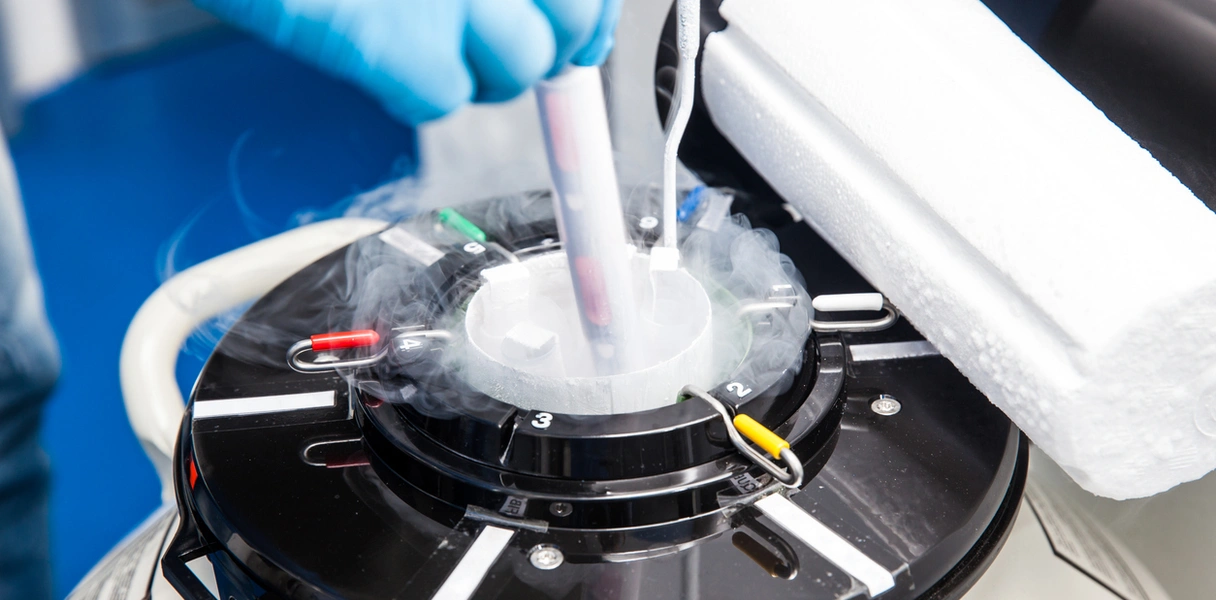Success rate after thawing following vitrification: up to 95%
Gamete preservation
A safe option to preserve fertility for the future

The preservation of gametes (eggs and sperm) and embryos makes it possible to postpone motherhood or fatherhood for medical or personal reasons, without compromising the quality of the reproductive cells. It is a key tool both in fertility treatments and in fertility preservation for oncology patients.
Vitrification
During the process, cryoprotective agents are used to protect the cells from freezing damage. This technique has progressively replaced conventional slow freezing and is currently the only safe option for egg freezing.
Egg freezing
Egg freezing is a highly recommended option for:- Women who must undergo cancer treatments such as chemotherapy or radiotherapy
- Women who wish to preserve their fertility for social or personal reasons (social freezing), postponing motherhood until a more suitable time in their lives

Sperm vitrification (sperm bank)
In assisted reproduction, sperm vitrification is a reliable and well-established method that has been successfully used for many years. This advanced freezing technique protects semen samples from the formation of ice crystals, one of the main causes of irreversible cell damage.Thanks to vitrification, sperm samples retain fertility almost equivalent to that of fresh sperm, achieving significantly better results than those obtained through traditional slow-freezing methods.
This technique is especially useful for:
- Preserving fertility before aggressive medical treatments (such as chemotherapy)
- Scheduled assisted reproduction procedures
- Donation or long-term storage

Embryo vitrification
Embryo vitrification is an essential part of fertility treatments. It is mainly used to preserve surplus embryos from an IVF cycle that are not transferred immediately.Only well-developed embryos with good implantation potential are selected for freezing. Vitrification allows them to be preserved without compromising their quality or future viability.
In addition, embryo freezing is recommended in the following cases:
- High risk of ovarian hyperstimulation syndrome
- Insufficient development of the endometrium (uterine lining)
- Presence of uterine conditions that hinder implantation
- Onset of acute illnesses that make an immediate pregnancy inadvisable

Ovarian tissue cryopreservation

This procedure consists of removing a portion of ovarian tissue containing follicles (immature eggs), freezing it through vitrification, and storing it safely. Later, once the patient has completed her treatment, the tissue can be reimplanted into the pelvis to restore natural ovarian function, including the possibility of achieving a spontaneous pregnancy.
This method is an especially valuable option for:
- Young oncology patients before starting treatment
- Prepubertal girls who cannot yet freeze eggs
- Women with autoimmune or metabolic diseases that affect the ovaries
- Ovarian tissue cryopreservation not only preserves fertility but can also help restore natural hormone production and prevent early menopause induced by medical treatments.
Frequently asked questions about gamete preservation
What is gamete preservation?
Gamete preservation is the process of freezing and storing eggs or sperm for future use, maintaining their viability for years without loss of quality.
In which cases is egg preservation recommended?
It is advised for women who wish to postpone motherhood, patients with low ovarian reserve, those undergoing medical treatments that may affect fertility (such as chemotherapy or radiotherapy), or those with a family history of early menopause.
When is it advisable to preserve sperm?
Sperm freezing is recommended for men who are going to undergo treatments that may damage fertility, those who have difficulty providing samples on the day of IVF treatment, or before a vasectomy.
At what age is it most advisable to freeze eggs?
Ideally before the age of 35, when egg quality and quantity are optimal. After that age, ovarian reserve and the genetic quality of eggs progressively decline.
How long can frozen gametes be stored?
Eggs and sperm can remain frozen for many years while maintaining viability. The storage time depends on current legislation and the patient’s reproductive wishes.
What are the chances of success when using preserved gametes?
Success rates depend mainly on the age at which the eggs were frozen and the quality of the sperm. In general, the younger the gametes are when preserved, the higher the chances of achieving pregnancy.
Is egg preservation painful?
Ovarian stimulation and egg retrieval may cause mild discomfort, similar to a heavy menstrual cycle. They are performed under medical supervision and sedation, so the patient hardly feels any pain.
How much does gamete preservation cost?
The cost varies depending on whether it involves eggs or sperm and on additional services included (such as stimulation, storage, or supplementary tests). The medical team can provide a personalised estimate for each case.